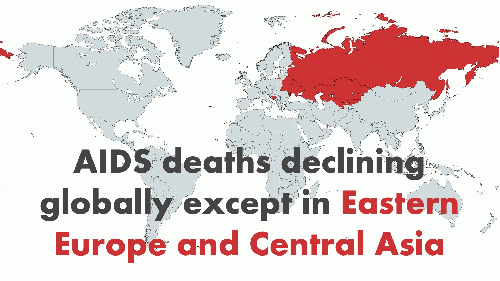AIDS deaths declining globally except in Eastern Europe and Central Asia
SHOBHA SHUKLA - CNS

Why are AIDS-deaths rising in Eastern Europe and Central Asia? When AIDS deaths can decline in other parts of the world, then why not here?
(Image by CNS) Details DMCA
AIDS-related deaths have declined worldwide except in Eastern Europe and Central Asia region. The latest data from joint United Nations programme on HIV/AIDS (UNAIDS) released last month shows that as compared to 2010, AIDS-related deaths have declined globally by more than half (51%) by 2023 but increased by 34.4% in Eastern Europe and Central Asia region.
The steepest decline in AIDS-related deaths during the period 2010-2023 among all the regions globally was in Eastern and Southern Africa (59%), followed closely by the Caribbean (57%) and Western and Central Africa (55%). This drop in AIDS-related deaths was 51% in Asia and the Pacific, 34% in Western and Central Europe and North America, 28% in Latin America and a mere 6% in Middle East and North Africa.
AIDS-related deaths are declining in all but one region - Eastern Europe and Central Asian region. This is a proxy for successful dissemination of lifesaving antiretroviral treatments across affected communities.
Not just AIDS-related deaths, even the number of new HIV infections has risen by 20% in Eastern Europe and Central Asia which is home to 2.1 million people living with HIV (5% of global population of people with HIV). There were 140,000 newly infected people with HIV in 2023 in Eastern Europe and Central Asia (out of 1.3 million people who got newly infected in 2023 worldwide). HIV adult prevalence in the region has increased from 0.5% in 2010 to 1.2% by 2023.
The number of new HIV infections in 2023 has increased in the Middle East and North Africa and Latin America regions also. However, in the rest of the regions the number of new HIV infections have shown a decline.
"In Asia and the Pacific region, there was a 14% decline in new HIV infections in 2022 but in 2023 it was 13%. So, the decline is stagnating. That is the challenge," said Eamonn Murphy, Director of UNAIDS Regional office of Eastern Europe and Central Asia and of Asia and the Pacific.
(Note: You can view every article as one long page if you sign up as an Advocate Member, or higher).





